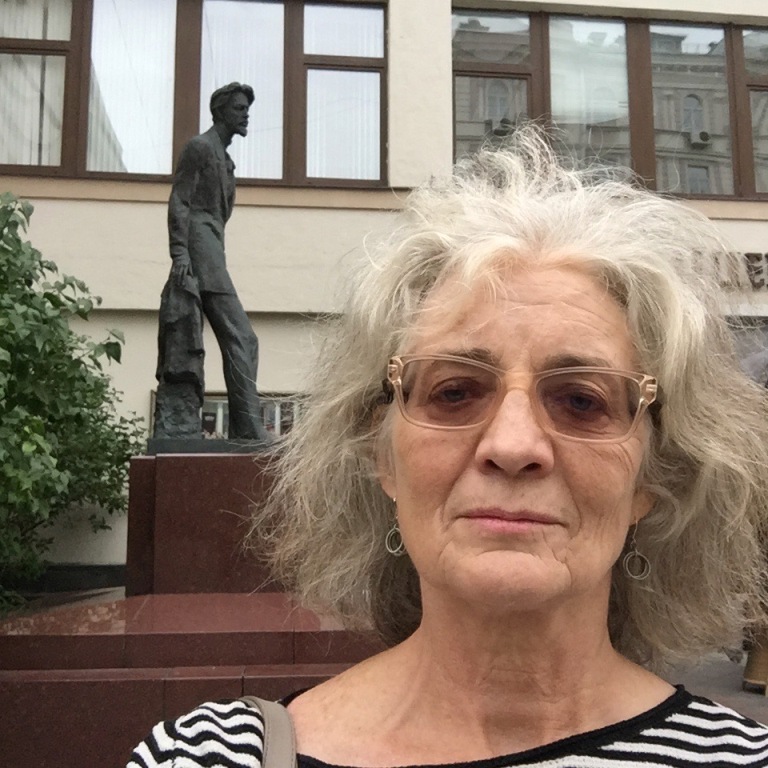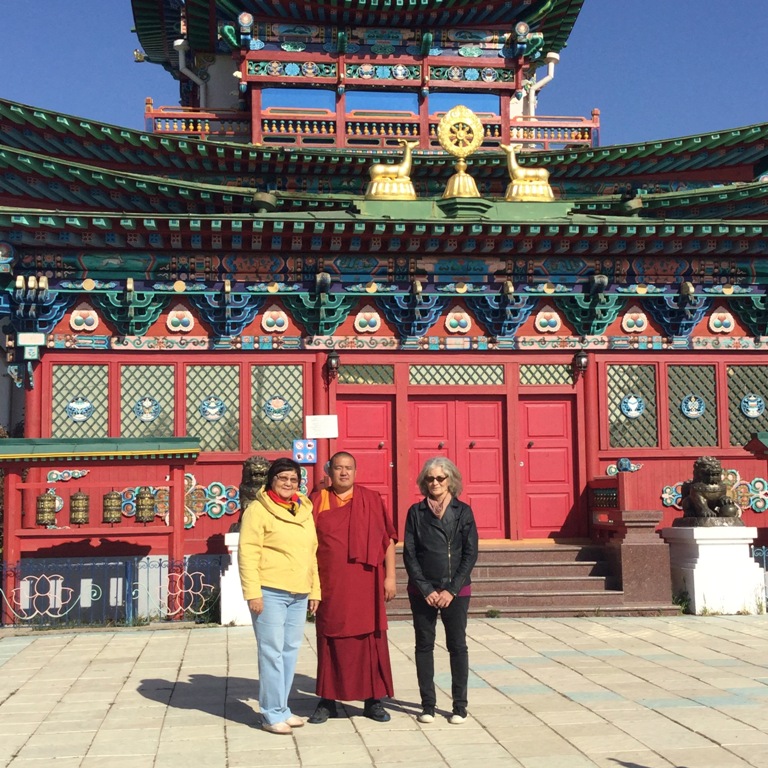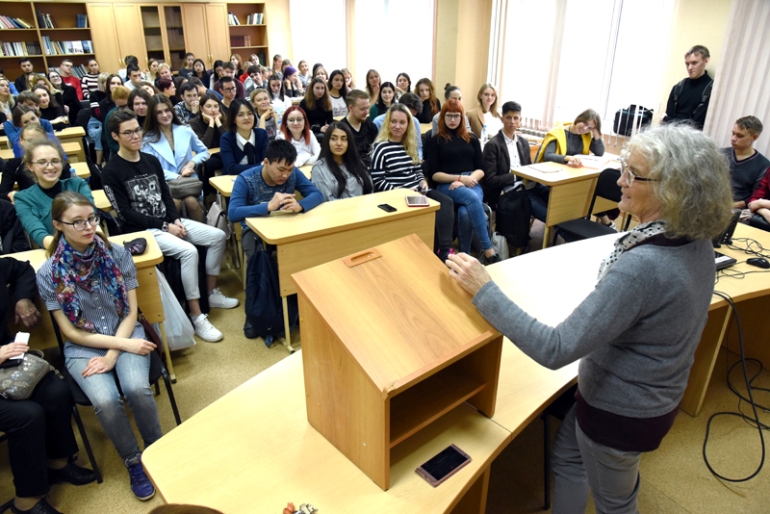
Carol Apollonio: “I think about Russian literature even while riding a motorcycle!”
/ Главная / Russkiy Mir Foundation / Publications / Carol Apollonio: “I think about Russian literature even while riding a motorcycle!”Carol Apollonio: “I think about Russian literature even while riding a motorcycle!”
Svetlana Smetanina
Carol Apollonio, president of the International Dostoevsky Society and professor Professor of the Practice of Slavic and Eurasian Studies at Duke University (USA), is a participant of the XIV Assembly of the Russkiy Mir. Quite a long time ago she started studying Russian to save the world. And today she believes that it is necessary to read Russian classical literature to have a better understanding of Russian people.
– During a meeting with students at Omsk State University last year, you told them that you had started studying Russian because you wanted to save the world. And today, how would youanswer the question ofwhy foreign students need to study Russian?
– As time progressed, I calmed down, just like the Rostovs in War and Peace... But I still want to save the world. And as for advising the students, I would tell them that the most important thing is not to learn the language for any specific, say, political goal, but, rather, to nourish the mind, enjoy the language of masters of literature, learn about the world of other people, strangers, and have a conversation with them. Just as we are doing now. This is the life-long task.

Carol Apollonio (at the monument to Chekhov in Kamergersky lane in Moscow)
And of course, the best way to understand Russians is to read Russian classical literature.
– That meeting in Omsk took place because of your idea to travel along the route that Anton Chekhov had travelled in 1890 heading to Sakhalin. What were your impressions of that trip?
– Words fail! Everything was so wonderful - I will never forget it. I want to travel again to Siberia, communicate with colleagues and friends that I met there, visit new places. The vast expanses are striking, of course - you go, go, go... and see no end. But you see beauty of nature; people are so generous and hospitable. I have no words! I am longing to go back so much… I wrote more details in the blog.
– And what about your students at Duke University - why do they choose Russian for study?
– We have liberal arts education, that is, general education. Students should take a variety of courses. The major studies begin in the middle of the second (out of four) year and those who want to become a professional or scientist shall continue their education after graduating from college (they should go to medical or law school, or for postgraduate training program). A foreign language is a compulsory subject, yet it is up to students what language to choose. They have language studies for two to three years.
Our students choose Russian less often than other languages (for example, Chinese or Spanish), but those who do are true elite - they have a brilliant mind, curiosity, creative attitude (there are writers, musicians, artists, dancers). They come from all kind of majors like mathematics and computer science, philosophy, politics, languages, economics and, of course, philology.
What are the reasons behind? First of all, they may have a family of Russian origin, as well as interest in literature; someone wants to pursue a career in politics, international relations; others love languages in general and want to try. And finally, their acquaintances and friends can also be the reason...
Once they started studying, they usually continue having fallen in love with the literature and language.

Meeting in Siberia
– In your opinion, what is the difference between Russian classical literature of the 19th century and literature of other countries? And are there actually any differences?
– Yes, there are (of course, each national literature has its own features). Russian literature is the most profound in the philosophical sense. Russian classical writers thoroughly explored themselves and people around them. They asked the most essential ("damned") questions, those questions that have no answers and therefore cause endless discussions among readers. Russian literature is philosophy, psychology, and culture. But most of all it is the art of language; words create a whole world that we can enter. Reading it means nourishing the mind and soul, as well as having fun in this magical world.
– Translators say that translations go out of date, and each new generation needs a new translation of classic works. Do you agree with this opinion? How often are the works of Dostoevsky, Chekhov, or Tolstoy published in later editions in the USA?
– Yes, the translation language ages, just like the original one. However, the best translators do understand the original language, and they are also masters of their languages. Such masters (Constance Garnett, for example, who began her work in the 1890s) are always worth reading, despite the fact that more and more new translations become available after theirs.
I'm not sure that more new translations of the classics are needed (for example, there are 13 English translations of Crime and Punishment). We need better criticism. Often critics do not understand the original language or the art of translation, but still write reviews or articles. As a result, very good translations go unnoticed and not very good ones enjoy great success being sold by skilled marketing experts. Nevertheless, I am very glad that there are so many translations of Russian classics: the more translations we have, the more readers will come.
In fact, over the past 30 years we have seen translations of Russian literature booming. And the criticism has been gradually improving.

Speaking at Omsk F. M. Dostoevsky State University. Photo credit: omskinform.ru
– Russian classics continue to attract filmmakers. Anna Karenina is one of the most filmed novels. Not so long ago, War and Peace, the BBC series, was released. In your opinion, what do modern viewers find appealing in these novels? What and who can they associate themselves with?
– I haven't watched this BBC series! To my shame, but I did it intentionally. I heard about the series, read a couple of reviews. And I didn't want to watch it at all! But I do not mind: the TV series will probably draw the audience's attention to the book.
This month I am reading the novel to the students. They asked me the same question. They may watch, but only having finished reading the novel!
By the way, I really love Anna Karenina by Joe Wright. An original concept is amazing. But many Russians do not like this adaptation, because it is quite different from the original (for example, in outer details: Anna is not full figured; Vronsky is blond; everything is very stylized...) .
– What advice would you give to parents who want to teach their children to read Russian classics?
– Be sure to read it aloud for them! It is very important. Lately, I have been starting each lesson with reading aloud to my students. They are not children, but grown-up young people. However, they listen with great interest and attention! Just as children do. I read aloud "Alyosha Gorshok" to my "Tolstoyans" (two minutes a day for a whole month!). Now I read them 2-3 paragraphs from A Confession every day. Of course, I will not finish it... But I hope that I have heightened their interest in the book, and they themselves will take and read it.
– And let me ask you a question off the topic. I read that you like to ride a motorcycle in your free time - is this a way to turn your attention off Russian classics?
– I think about Russian literature even while riding a motorcycle! About Chekhov, for example. But I try to forget about university policies, student term papers, committees, reports, audits...
Like all Russians, I love fast ride. It makes you free.
New publications

 Mikhail Kalatozov, a director who transformed the world of cinematography in many ways, was born 120 years ago. He was a Soviet film official and a propagandist. Above all, he was capable of producing movies that struck viewers with their power and poetic language.
Mikhail Kalatozov, a director who transformed the world of cinematography in many ways, was born 120 years ago. He was a Soviet film official and a propagandist. Above all, he was capable of producing movies that struck viewers with their power and poetic language.  Ukrainian authorities have launched a persecution campaign against the canonical Ukrainian Orthodox Church (UOC), the biggest one in the country's modern history. Over the past year, state sanctions were imposed on clergy representatives, searches were conducted in churches, clergymen were arrested, criminal cases were initiated, the activity of the UOC was banned in various regions of the country, and monasteries and churches were seized.
Ukrainian authorities have launched a persecution campaign against the canonical Ukrainian Orthodox Church (UOC), the biggest one in the country's modern history. Over the past year, state sanctions were imposed on clergy representatives, searches were conducted in churches, clergymen were arrested, criminal cases were initiated, the activity of the UOC was banned in various regions of the country, and monasteries and churches were seized.  When Nektary Kotlyaroff, a fourth-generation Russian Australian and founder of the Russian Orthodox Choir in Sydney, first visited Russia, the first person he spoke to was a cab driver at the airport. Having heard that Nektariy's ancestors left Russia more than 100 years ago, the driver was astonished, "How come you haven't forgotten the Russian language?" Nektary Kotlyaroff repeated his answer in an interview with the Russkiy Mir. His affinity to the Orthodox Church (many of his ancestors and relatives were priests) and the traditions of a large Russian family brought from Russia helped him to preserve the Russian language.
When Nektary Kotlyaroff, a fourth-generation Russian Australian and founder of the Russian Orthodox Choir in Sydney, first visited Russia, the first person he spoke to was a cab driver at the airport. Having heard that Nektariy's ancestors left Russia more than 100 years ago, the driver was astonished, "How come you haven't forgotten the Russian language?" Nektary Kotlyaroff repeated his answer in an interview with the Russkiy Mir. His affinity to the Orthodox Church (many of his ancestors and relatives were priests) and the traditions of a large Russian family brought from Russia helped him to preserve the Russian language.

 The leaders of the Friends of the Great Russia cultural association (Amici Della Grande Russia) in Italy believe that the Western policy of abolishing Russian culture in Europe has finally failed. Furthermore, it was doomed to failure from the beginning.
The leaders of the Friends of the Great Russia cultural association (Amici Della Grande Russia) in Italy believe that the Western policy of abolishing Russian culture in Europe has finally failed. Furthermore, it was doomed to failure from the beginning.  Name of Vladimir Nemirovich-Danchenko is inscribed in the history of Russian theater along with Konstantin Stanislavski, the other founding father of the Moscow Art Theater. Nevertheless, Mr. Nemirovich-Danchenko was a renowned writer, playwright, and theater teacher even before their famous meeting in the Slavic Bazaar restaurant. Furthermore, it was Mr. Nemirovich-Danchenko who came up with the idea of establishing a new "people's" theater believing that the theater could become a "department of public education."
Name of Vladimir Nemirovich-Danchenko is inscribed in the history of Russian theater along with Konstantin Stanislavski, the other founding father of the Moscow Art Theater. Nevertheless, Mr. Nemirovich-Danchenko was a renowned writer, playwright, and theater teacher even before their famous meeting in the Slavic Bazaar restaurant. Furthermore, it was Mr. Nemirovich-Danchenko who came up with the idea of establishing a new "people's" theater believing that the theater could become a "department of public education."  "Russia is a thing of which the intellect cannot conceive..." by Fyodor Tyutchev are famous among Russians at least. December marks the 220th anniversary of the poet's birth. Yet, he never considered poetry to be his life's mission and was preoccupied with matters of a global scale. Mr.Tyutchev fought his war focusing on relations between Russia and the West, the origins of mutual misunderstanding, and the origins of Russophobia. When you read his works today, it feels as though he saw things coming in a crystal ball...
"Russia is a thing of which the intellect cannot conceive..." by Fyodor Tyutchev are famous among Russians at least. December marks the 220th anniversary of the poet's birth. Yet, he never considered poetry to be his life's mission and was preoccupied with matters of a global scale. Mr.Tyutchev fought his war focusing on relations between Russia and the West, the origins of mutual misunderstanding, and the origins of Russophobia. When you read his works today, it feels as though he saw things coming in a crystal ball...